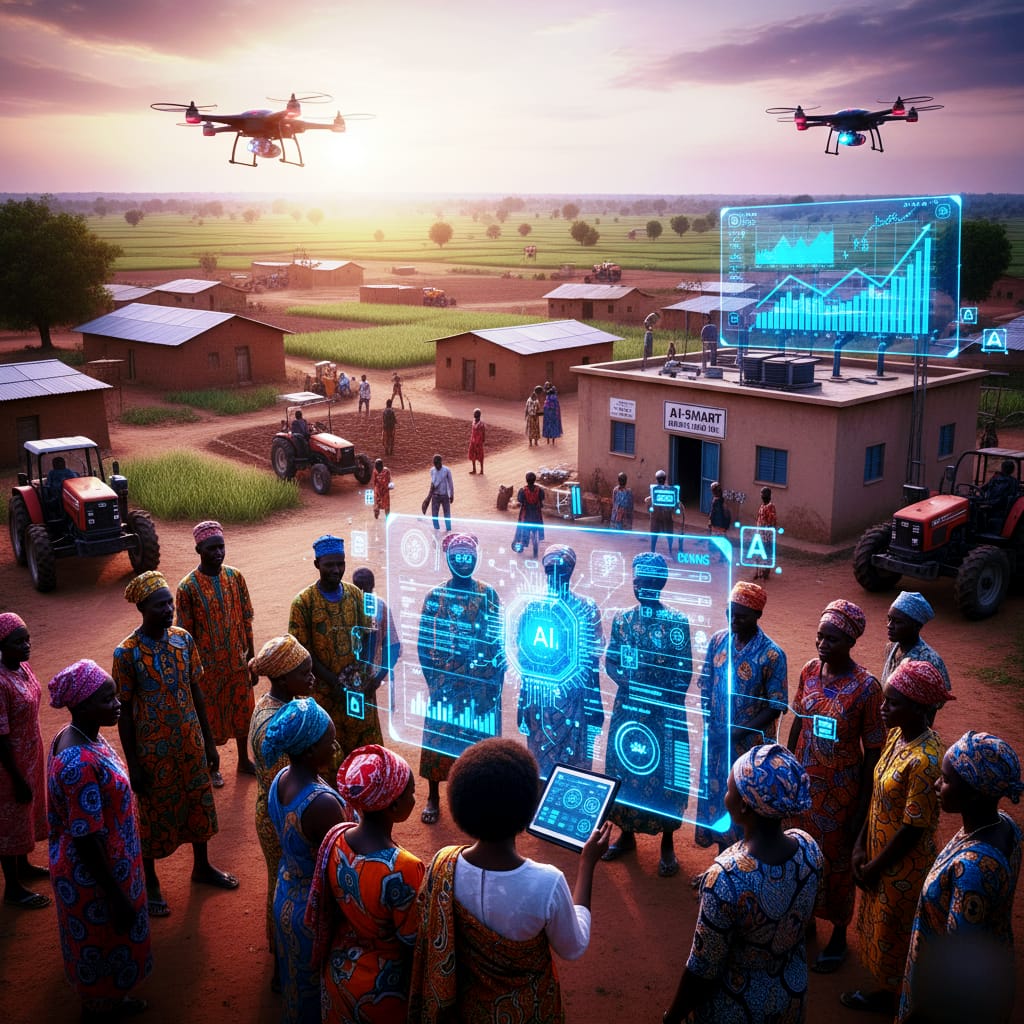Artificial Intelligence (AI) is no longer a concept reserved for tech hubs and innovation centres, it is rapidly transforming the economic landscape of rural Nigeria.
Once characterized by limited access to infrastructure, markets, and education, many rural communities are now beginning to harness the power of AI to drive growth, create opportunities, and improve livelihoods.
From precision farming and digital finance to healthcare and education, AI is emerging as a silent engine fueling grassroots development across the country.
Read Also: Top 5 lucrative businesses you can start with ₦77,000 in Nigeria
Bridging the urban–rural divide through technology
For decades, the economic gap between Nigeria’s urban and rural regions has been defined by unequal access to information, capital, and infrastructure.
However, with the advent of affordable smartphones, improved internet connectivity, and government-backed digital initiatives, rural communities are increasingly connected to the digital economy.
AI-powered platforms are at the forefront of this transformation. Through machine learning and data analytics, these systems are helping farmers, traders, and small business owners make better decisions, access financial services, and optimize their productivity.
In simple terms, AI is making rural entrepreneurship smarter, faster, and more profitable.
Transforming agriculture through precision and prediction
Agriculture remains the backbone of Nigeria’s rural economy, employing more than 60% of the population.
Yet, challenges such as unpredictable weather, pests, poor soil conditions, and limited access to market data have hindered productivity for decades. AI is changing this narrative.
Startups like Zenvus and Hello Tractor are using AI-driven solutions to assist farmers in maximizing yields. Zenvus, for instance, uses sensors and analytics to monitor soil nutrients, moisture levels, and crop health, providing farmers with real-time insights on when and how to plant, irrigate, or harvest.
Hello Tractor, often called the “Uber for Tractors,” employs AI to connect farmers who need equipment with tractor owners, ensuring efficient resource allocation and reducing manual labor costs.
Similarly, predictive AI tools are being used to analyze weather patterns and forecast potential risks.
By combining satellite data with AI models, farmers can anticipate droughts, floods, or pest outbreaks, allowing them to take preventive measures.
These innovations are not only boosting productivity but also reducing waste and ensuring food security.
AI and Financial Inclusion
Access to financial services has traditionally been one of the biggest barriers to economic growth in rural Nigeria. Many rural dwellers lack formal banking records, making it difficult to obtain loans or credit. AI-powered fintech platforms are bridging this gap.
Companies such as Moniepoint, FairMoney, and Carbon are leveraging AI algorithms to assess creditworthiness using alternative data sources such as mobile phone usage, transaction history, and even social behaviour.
This approach allows rural entrepreneurs and farmers to access microloans, expand their businesses, and participate in the formal economy.
Moreover, AI is helping reduce fraud and streamline financial transactions. By analysing user behaviour and detecting anomalies, AI systems can prevent unauthorised transactions and secure mobile banking services, building trust among first-time users in rural areas.
Read Also: Top 15 AI tools every professional should know in 2025
Improving healthcare and social welfare
AI’s impact extends beyond economics; it is also revolutionising healthcare delivery in underserved areas. Rural Nigeria often faces shortages of medical professionals and healthcare facilities.
AI-powered telemedicine platforms are filling this gap by providing virtual consultations and diagnostic assistance.
For example, mobile health apps now use AI chatbots to offer preliminary medical advice, symptom checks, and reminders for vaccination schedules.
These solutions ensure that even remote communities can access timely health information and basic medical support.
Some AI-driven diagnostic tools can even detect diseases such as malaria or tuberculosis using simple image recognition techniques, reducing the need for laboratory testing.
In addition, AI systems are assisting government agencies and NGOs in targeting social welfare programs more effectively.
By analysing demographic and economic data, AI can identify vulnerable groups and ensure that interventions, such as agricultural subsidies or healthcare support, reach those who need them most.
Education and skill development in the digital age
Empowering rural Nigerians with the skills to thrive in a digital economy is crucial for sustained growth. AI is making education more accessible and personalised. Through adaptive learning platforms, students in remote areas can now learn at their own pace, guided by AI tutors that assess their strengths and weaknesses.
Organisations such as uLesson and Google’s AI for Education initiatives are providing digital learning solutions that cater to rural schools with limited resources.
These platforms use interactive video lessons, quizzes, and progress tracking to make learning engaging and data-driven. By integrating AI into rural education, Nigeria is nurturing a new generation of digitally literate youth capable of driving innovation in their communities.
Challenges and the road ahead
Despite the progress, several challenges remain. Inconsistent power supply, limited broadband infrastructure, and low digital literacy still hinder the widespread adoption of AI in rural areas. Additionally, there is a need for strong data privacy regulations and ethical frameworks to ensure that AI technologies are used responsibly and inclusively.
However, with growing investment from both government and private sectors, the outlook remains promising. The Nigerian government’s National Artificial Intelligence Strategy, launched to promote innovation and research, aims to position the country as a leader in AI-driven development in Africa.
AI is quietly reshaping the foundations of rural Nigeria’s economy. By empowering farmers, traders, students, and healthcare workers with intelligent tools, it is fostering self-reliance, efficiency, and inclusion. The ripple effects are already visible: higher agricultural yields, greater financial access, improved health outcomes, and better education.
As technology continues to advance, the fusion of AI and rural innovation will not just narrow the urban-rural divide; it will redefine what is possible in Nigeria’s pursuit of sustainable and inclusive growth.



